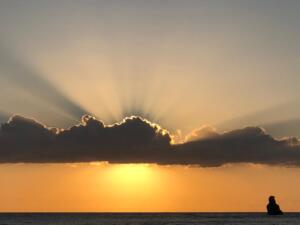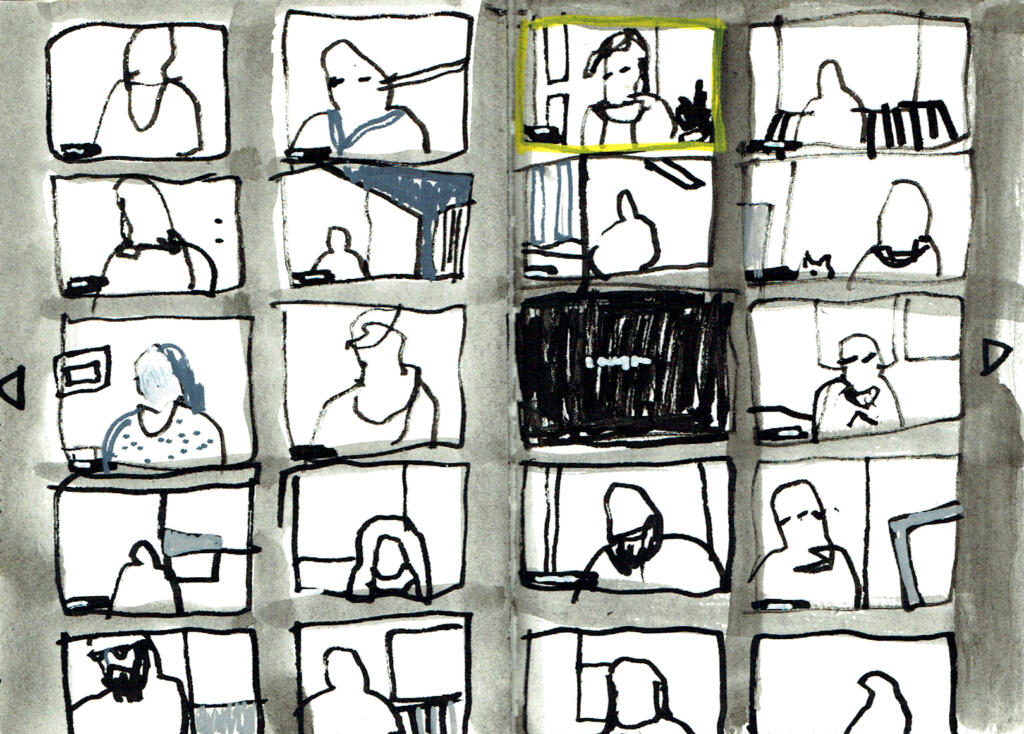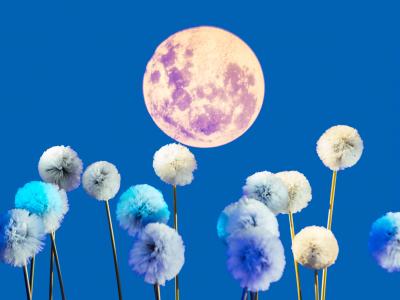Issue 6: Hear from the ENO Breathe Community
9th March 2023
This month’s newsletter coincides with the beginning of the Pandemic, the National Day of Reflection. It also marks the 3 year anniversary for some of us with long Covid.

It is not something I can imagine that any of us will be celebrating, but some of us have managed to find silver linings to the situation we have found ourselves in.
We have some wonderful art, and three pieces from people who have found new ways to do things within the confines of their illness – and have found themselves in a better place. It gives us all hope.
Thank you all for sharing.
My problems with Covid and then Long Covid started early, in March 2020, and I joined the fantastic ENO Breathe programme a year later. I’m an artist who has written a couple of books about drawing, so it was natural for me to want to make a drawing of the group in action. Looking at the drawing now, in my recovered state, I am taken back to the great sense of support, hope and community that each session would bring me during such a worrying and uncertain time.

Gavin Wells: After Long Covid: not the same, but stronger
When I went to hospital in March 2020 with breathing problems, I was a fit healthy 54-year-old – ex army and a keen cook, I was in good health inside and out. After five weeks intubated, sedated and on dialysis for a large part of the time, I came to, moved to a ward, and was discharged home a week later on 30th April. I had lost 18% of my bodyweight, resembled Tom Hanks on Cast Away, and had the vacant look some call the thousand-yard stare.
It took me more than six months to get used to being home, to walk to the end of the road, and to get upstairs on my own. The NHS sent physios, home care, and the speech and language therapy team to help me relearn how to swallow and thus eat: I felt I was getting better; but then my progress ‘just stopped’. With the relief of being alive and being home gone, interrupted sleep, difficult breathing, aching joints, severe fatigue, new lumps and bumps on knuckles all made me feel as though I had aged twenty years.
At the start of 2021 like many areas of the country, Long Covid clinics didn’t yet exist in Kent, and while I was part of several clinical trials, they were getting more information from me than I was from them. However, one thing they said hit me hard: that despite putting on 5kg of much needed weight I had lost muscle mass….and it wasn’t as if I had any to lose! It was then that I realised if I was going to get better it would need to be through my own devices.
I tried a breath coach, a physio for my joints, and acupuncture for all over support. I moved to an osteo, kept the acupuncture, and tried a herbologist. My son, a fit teenager home from university, adapted some of the gym exercises he did for me – I couldn’t do a press up, so I started by kneeling and doing half of one. Around that time, I found out about my microbiome, and was referred to a long Covid clinic, but the only significant help they offered was referral to ENO Breathe. It was thanks to this that eighteen months after leaving hospital I was learning how to breathe again and how to prevent the panic-induced high chest breathing which had become my new norm. I was also working on re-building my microbiome, which was found to be a paltry 4 out of 10 (compared to my wife’s 9) that a local UK company had analysed. Thanks to my new perspective on breathing, I started to use a static bike, and I was at the gym three times a week, every week – albeit only for 15 minutes initially. I continued with acupuncture as my core health care to help with the continued joint aches and disturbed sleep.
It’s now 2023. My lungs are scarred, some joints are mishappen, and I can’t run. Joints and tendons seem to damage more easily. BUT….
I no longer struggle with my breathing – I may use sticks to keep up with my wife when going uphill, but I can always get to the top. I haven’t had to sleep during the day for more than six months. My microbiome is up at 8.5. I am physically stronger than I have ever been and can now train in the gym for 90 minutes. Knowing how to breathe and how to rebuild my second brain, as some refer to the microbiome, have been key… not to my recovery to my former self, but to me finding a new, different, and in many ways stronger, self. Two months ago, my acupuncturist gave me my first ‘maintenance treatment’ with no obvious issues to fix – a testament to the newly well-balanced state of my health.
I doubt I will ever be grateful for Covid, but I am grateful for the journey on which I have been as a result, and from which I am emerging as a happier, emotionally stronger husband, father, and man. The army taught me to be independent and resilient, but this has shown me that my strength comes as much, or more, from my family and those close to me. The last few years have led me to reconsider the direction of my life – a common occurrence when life is threatened. I now have a much better balance of work (less) and life (family, exercise, learning, volunteering: all more) and am coming into a sense of contentment much deeper than the transitory happiness I used to seek…. a much better outcome than any I hoped for back in 2020.
Flo van Diemen van Thor: A Novel way to kick brain fog
I won’t exactly be cracking open any champagne next month for my three-year anniversary, but at the same time, I have obviously lived to tell the tale. Part of that tale after three years is as someone emerging who is wiser with many new friends.
The unexpected part, that I became increasingly worried about is the Long Covid brain fog. Not something I can afford to have in my role as an executive coach who supports NHS trainee doctors! My capacity to recall and retain verbal information, ability to focus and stay focused for long periods of time, and my usual fast thinking and processing were all badly affected.
So, I decided to kick my brain back into the required gear by learning a new language. I speak my second language all day and even at my worst that never became a problem, so why not another language (to add to my native Dutch, and previously learnt English, French, German, Spanish,and Swedish)? Along with another million learners who were locked down in various parts of the world I enrolled in an online class Welsh in January 2021.
Oh boy, if you want to bake your brain, learn Welsh! My classmates and I soon discovered it is so difficult, all you can do is laugh. We celebrated our minor victories, hooted at our fumbles, and learned to accept the answer, ‘it just does’ when we queried why this or that works a particular way in Welsh. It was a cheerful two hours each week, even when I when I was at my most exhausted.
Nearly three years after contracting Covid, I sat the entry level exam Welsh in Pembrokeshire. We had an absolute ball tackling the exam papers, getting through the oral examination and of course, heading down to the pub afterwards to siarad with each other for hours afterwards. And whether or not my language learning has anything to do with it or not is likely to remain unproven, but my brain is hurtling along at great speed once again. I do know one thing for sure: the Welsh language works in mysterious ways!
I don’t have any connection to Wales, other than would like to live there at some point, but learning Welsh and trying to keep it up now is purely for the joy of it. It was all so bleak this time two years ago, but, together with my ENO Breathe programme sessions, the classes were the cheerful part of my week! I can now sing Welsh lullabies too, and frequently do when I sing my ENO exercises.
Helen Cox Canons: There’s always a silver lining … how redundancy with long Covid helped me
8th March 2020: a date that will forever be etched on my brain. It’s the day I caught Covid, the strange virus that everyone was talking about and was headlining in the news, but which still seemed like some kind of surreal dream. This was pre-lockdown, pre-mask-wearing, pre-hand sanitiser and pre-Chris Witty standing, unblinking, at a wooden lectern.
It’s a long story. As all long Covid stories are. I spoke to my GP who thought I had covid and prescribed antibiotics because of my history of chest problems. I emailed my manager at work to let her know, and then signed myself off sick the next week using the NHS online Covid form, which I did repeatedly for next 8 weeks. The replies were at first concerned and sympathetic but by the end of the 8 weeks, they were terse, cold and short. I was starting to get questions: Do you think you could start next week? Why is it taking you so long to get better? It didn’t help that a lady in Finance had been rushed to hospital, recovered, and returned to work all within the time period that I was off sick. It didn’t help that my employer was a publishing company based in the US, where employees’ rights are far less amenable than in the UK. And it didn’t help me to feel any better from Covid, which was slowly ravaging my body, making me feel like pure hell.
After some negotiations, we agreed that I could return in week 9 and do afternoons only as I functioned better at that time. But that was only allowed for a week, after which time I was expected to get back to full time. So, return I did, wheezing, coughing and migraining my way through my workload, trying to look my usual enthusiastic-self. I’d worked there intermittently since 2002 surviving four redundancies, because I was a good worker. Not any more… I was painfully slow, kept asking my manager to repeat instructions, and could barely even remember my name, let alone a job that I’d done for years. But I tried my best, and was pleased that (lockdown aside) my life was getting back to some kind of ‘normality’.
Four weeks later, I was told my role was up for redundancy. And the kick? It was me or my manager, who was a very good friend. There were only two of us on the editorial team, and my manager, who had covered me whilst off sick, was still helping with my workload on my return. So, it was a no-brainer. Even if they’d offered to keep me on instead of her, being a decent human being, I really couldn’t in all conscience agree to that. Had this been a normal situation, with us all in the office and my health intact, I might have put up a fight to keep both our jobs. But I was just too ill to be that concerned, and I knew that I was too ill to do the job properly – I just wanted to disappear as quickly as possible. It was too humiliating, and was also having a serious impact on my family who, like everyone else in the country, were all now home-based, having to live through the whole ghastly redundancy process. I shuffled off from that job in a puff of virtual smoke.
I had one small victory. I managed to get them to let me keep my laptop. Every freelancer in the land will know that your laptop or device is your workplace and your livelihood. So, the following day after leaving that job, I was emailing all my contacts for further work. I realised that certain jobs would be beyond my current limited capability: writing books would have to wait for some time. One job I took on proved too demanding for me, a fact that was really hard to admit, and I knew would potentially damage my reputation as a freelance editor. However, I was fortunate that the person who had hired knew me from the past and had suffered from Chronic Fatigue years previously.
Soon, some regular work started to flow, and I consider myself very fortunate that I’ve been working constantly ever since. The projects that I edit consist of lots of very short documents, which are easy to dip in and out of. I slowly stopped sitting rigidly at my desk in standard working hours and made myself a loose, Covid-friendly routine, with breaks for brain, breathing exercises and of course, coffee! With this routine I was able to manage maximum of 3-4 hours of work a day. On the plus, I was able to sit down between jobs and watch a cheering episode of Miranda or Friday Night Dinner whenever I wanted, or go for a short walk in the middle of the morning! Despite lockdown, my life was actually becoming enriched. I taught myself to crochet. As someone who has never created anything attractive in my life, this felt like a huge achievement. I no longer had to commute to work which was exhausting and stressful even when fit. And I was spending lots of time with my two daughters, who were nursing me through my long Covid, and had by now become expert cooks.
Several months and a relationship breakdown later, I bought a kitten, who instantly filled our home with pure joy. Then I got another one. And then, last year, we got our Cavapoo puppy, Alba. She lies by my side while I tap away at my laptop, providing me with an excellent reason to stop working, and get me out of the house and chatting to newly discovered dog-friendly neighbours. She gives me cuddles when I’m having one of those bad long Covid days, when you feel like you’re wading through treacle.
One day last summer, when having a break in the garden, I looked around me reflecting on the difficult times I’d been through. I realised that I’d been stuck in a rut in my job and hadn’t been that happy in it for a long time. It had just been a force of habit and a salary that had kept me there; I don’t think I would’ve willingly left it. But Covid had actually provided me with a means of escape and – although I obviously wish I didn’t have long Covid – there are many ways in which its consequences have enriched my life. I believe everything happens for a reason. And Covid has changed my life for the better.
A huge thank you to everybody who contributed content for this issue. Please do get in touch with any ideas or submissions that you would like to be considered for future newsletters. This can include poetry, prose, artwork, or anything else. If you want to write something but you’re not quite sure what, please do get in touch at [email protected] to chat about it.
– Joanna Herman, Content Curator


